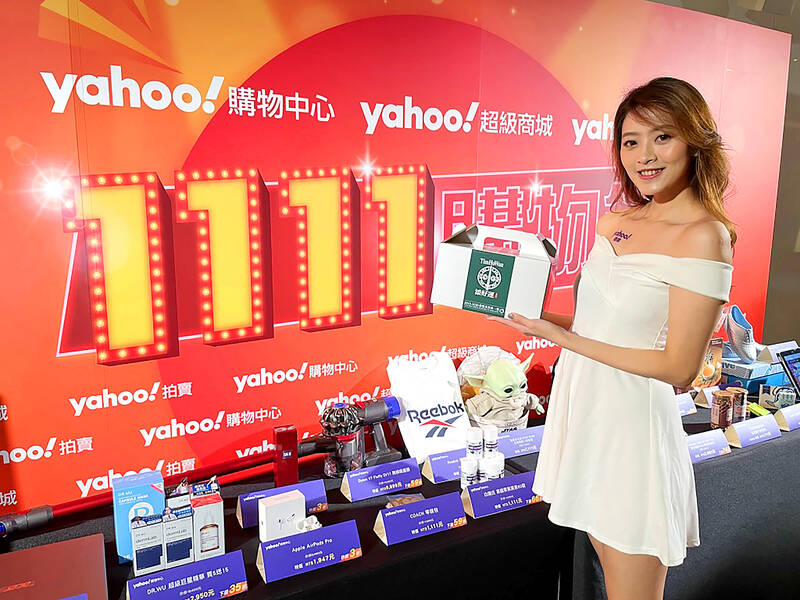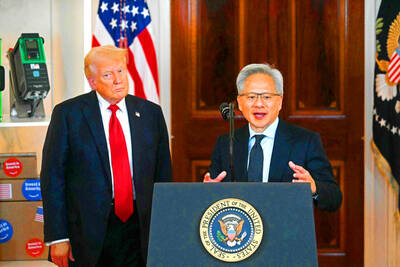Food conglomerate Uni-President Enterprises Corp (統一企業) has acquired convertible corporate bonds issued by Yahoo Taiwan Holdings Ltd (雅虎), setting its sights on cooperating with Yahoo in e-commerce.
In a statement released on Friday, Uni-President said its subsidiary Cayman President Holdings Ltd spent US$25 million to acquire Yahoo Taiwan’s corporate bonds, adding that the investment would not target any stake ownership in Yahoo, but did not rule out teaming up with Yahoo in e-commerce.
The food giant said the group has put a wide range of products on Yahoo’s e-commerce platform for many years, and that the two sides have forged close business ties.

Photo: CNA
If Uni-President and Yahoo team up in e-commerce development, the cooperation is expected to enhance the food supplier’s competitive edge in this field, as Yahoo has built a large pool of e-commerce talent and is capable of providing prompt logistics services to local consumers after doing business in Taiwan for more than two decades, Uni-President said.
At present, Uni-President owns Books.com.tw (博客來), which generates almost NT$8 billion (US$256 million) in revenue per year by selling books and miscellaneous items online, while President Chain Store Corp (統一超商), which owns more than 6,000 7-Eleven convenience stores in Taiwan, launched iOPEN Mall in March last year to further penetrate the e-commerce sector.
In addition, Uni-President’s organic food unit Santa Cruz (聖德科斯) sells fresh meat, seafood, vegetables and fruit online, while Cosmed (康是美), a health and beauty unit, also owns the online eShop.
In recent years, Uni-President has devoted itself to building a regional logistics platform by integrating its offline and online retail capabilities, with its business spanning across Asia including China, South Korea, the Philippines, Vietnam, Thailand and Indonesia. In Taiwan, Uni-President operates 45 logistics centers.
The company’s consolidated sales last year grew 10.74 percent year-on-year to NT$580.99 billion.

Taiwan Semiconductor Manufacturing Co (TSMC, 台積電) last week recorded an increase in the number of shareholders to the highest in almost eight months, despite its share price falling 3.38 percent from the previous week, Taiwan Stock Exchange data released on Saturday showed. As of Friday, TSMC had 1.88 million shareholders, the most since the week of April 25 and an increase of 31,870 from the previous week, the data showed. The number of shareholders jumped despite a drop of NT$50 (US$1.59), or 3.38 percent, in TSMC’s share price from a week earlier to NT$1,430, as investors took profits from their earlier gains

AI TALENT: No financial details were released about the deal, in which top Groq executives, including its CEO, would join Nvidia to help advance the technology Nvidia Corp has agreed to a licensing deal with artificial intelligence (AI) start-up Groq, furthering its investments in companies connected to the AI boom and gaining the right to add a new type of technology to its products. The world’s largest publicly traded company has paid for the right to use Groq’s technology and is to integrate its chip design into future products. Some of the start-up’s executives are leaving to join Nvidia to help with that effort, the companies said. Groq would continue as an independent company with a new chief executive, it said on Wednesday in a post on its Web

CHINA RIVAL: The chips are positioned to compete with Nvidia’s Hopper and Blackwell products and would enable clusters connecting more than 100,000 chips Moore Threads Technology Co (摩爾線程) introduced a new generation of chips aimed at reducing artificial intelligence (AI) developers’ dependence on Nvidia Corp’s hardware, just weeks after pulling off one of the most successful Chinese initial public offerings (IPOs) in years. “These products will significantly enhance world-class computing speed and capabilities that all developers aspire to,” Moore Threads CEO Zhang Jianzhong (張建中), a former Nvidia executive, said on Saturday at a company event in Beijing. “We hope they can meet the needs of more developers in China so that you no longer need to wait for advanced foreign products.” Chinese chipmakers are in

POLICY REVERSAL: The decision to allow sales of Nvidia’s H200 chips to China came after years of tightening controls and has drawn objections among some Republicans US House Republicans are calling for arms-sale-style congressional oversight of artificial intelligence (AI) chip exports as US President Donald Trump’s administration moves to approve licenses for Nvidia Corp to ship its H200 processor to China. US Representative Brian Mast, the Republican chairman of the US House Committee on Foreign Affairs, which oversees export controls, on Friday introduced a bill dubbed the AI Overwatch Act that would require the US Congress to be notified of AI chips sales to adversaries. Any processors equal to or higher in capabilities than Nvidia’s H20 would be subject to oversight, the draft bill says. Lawmakers would have